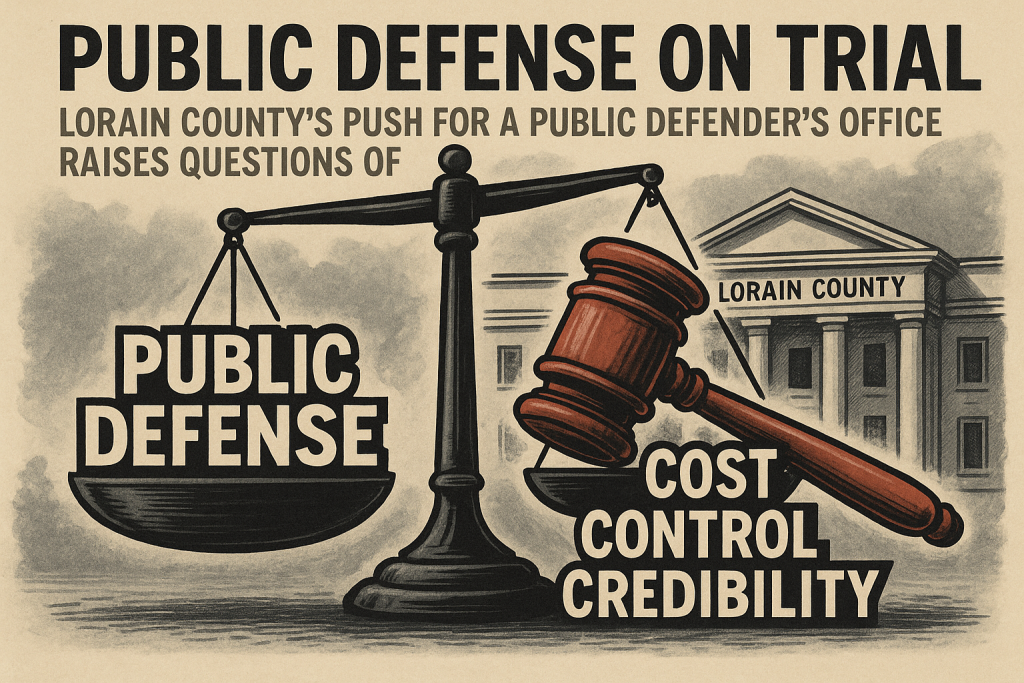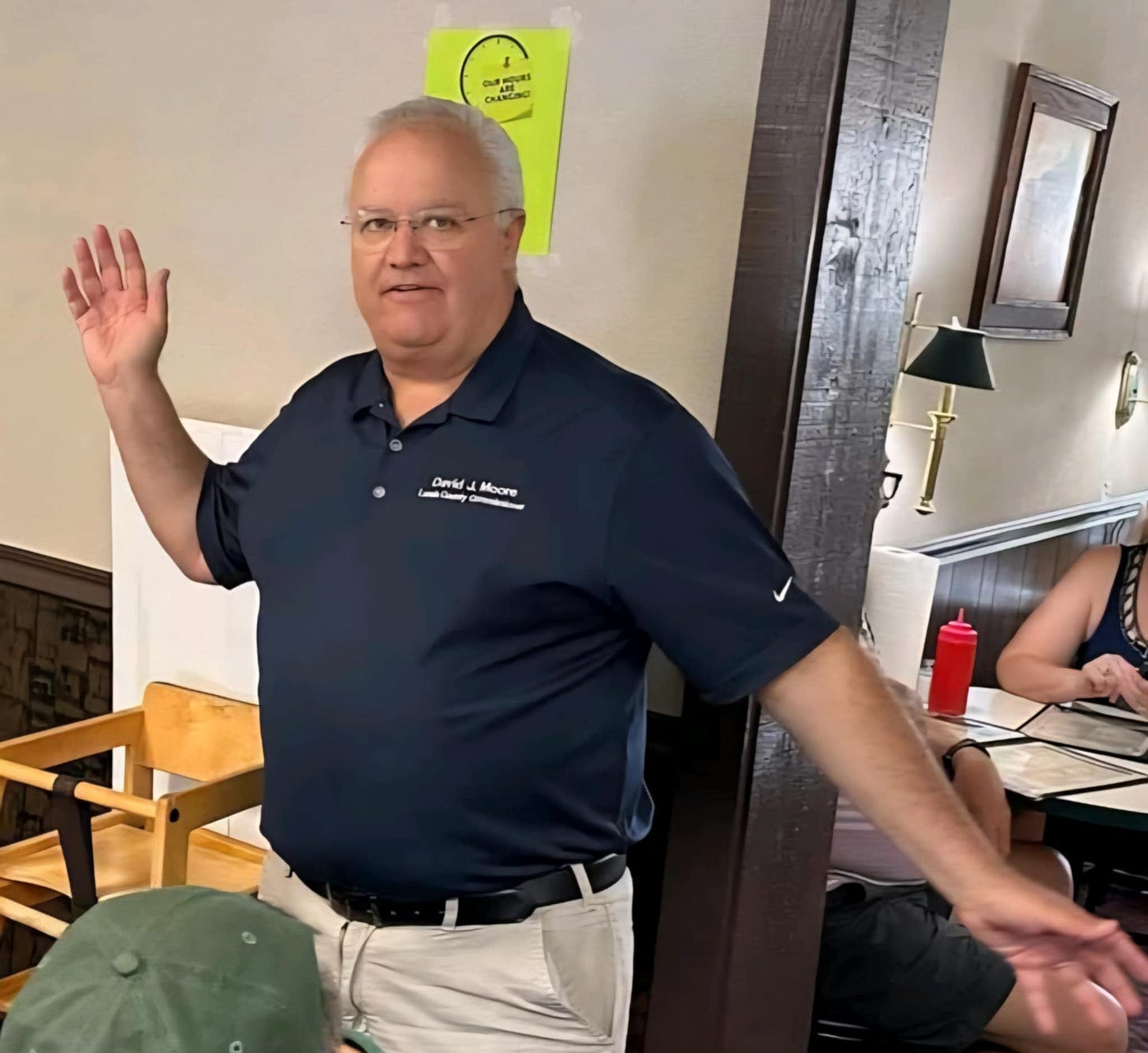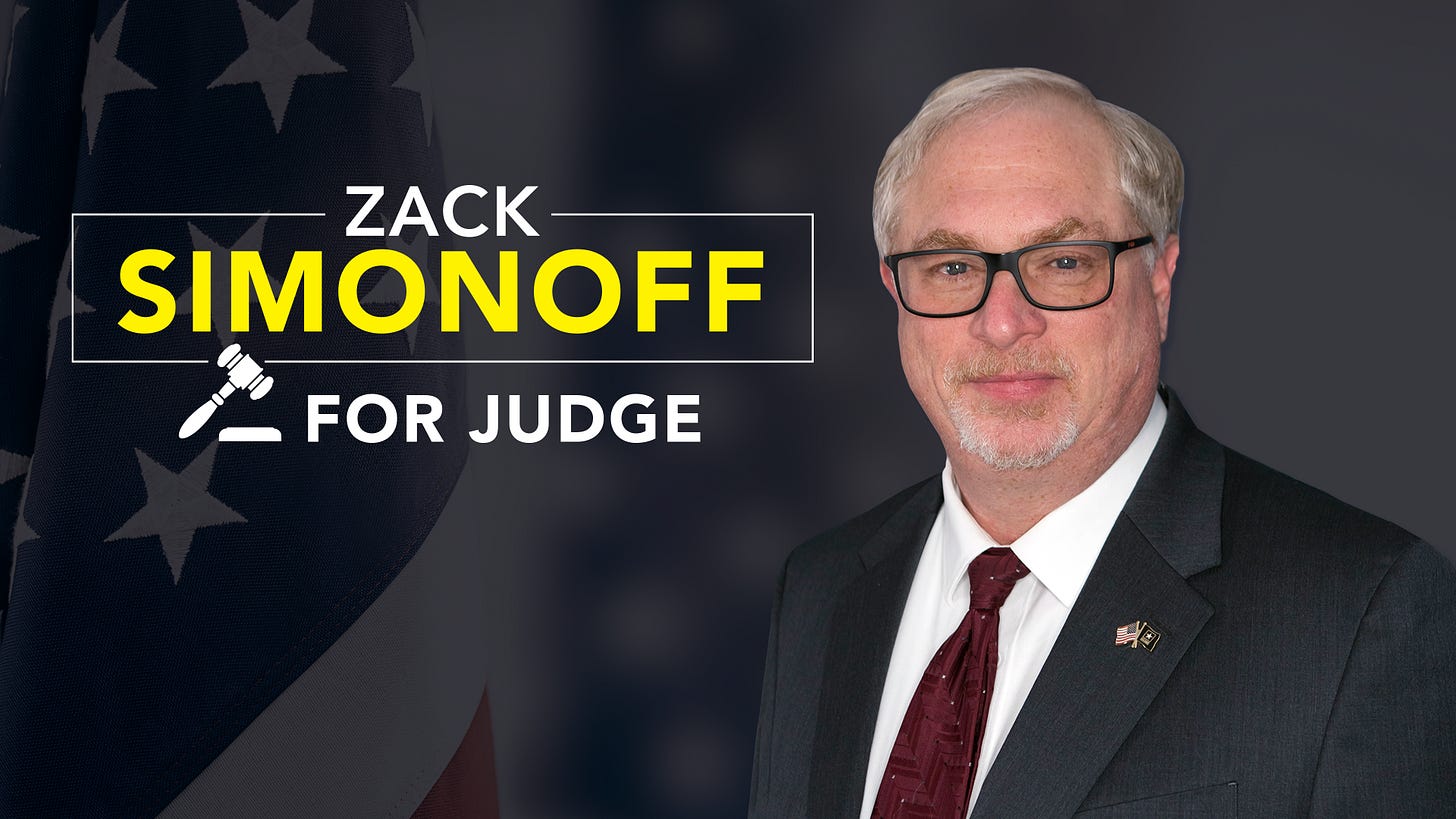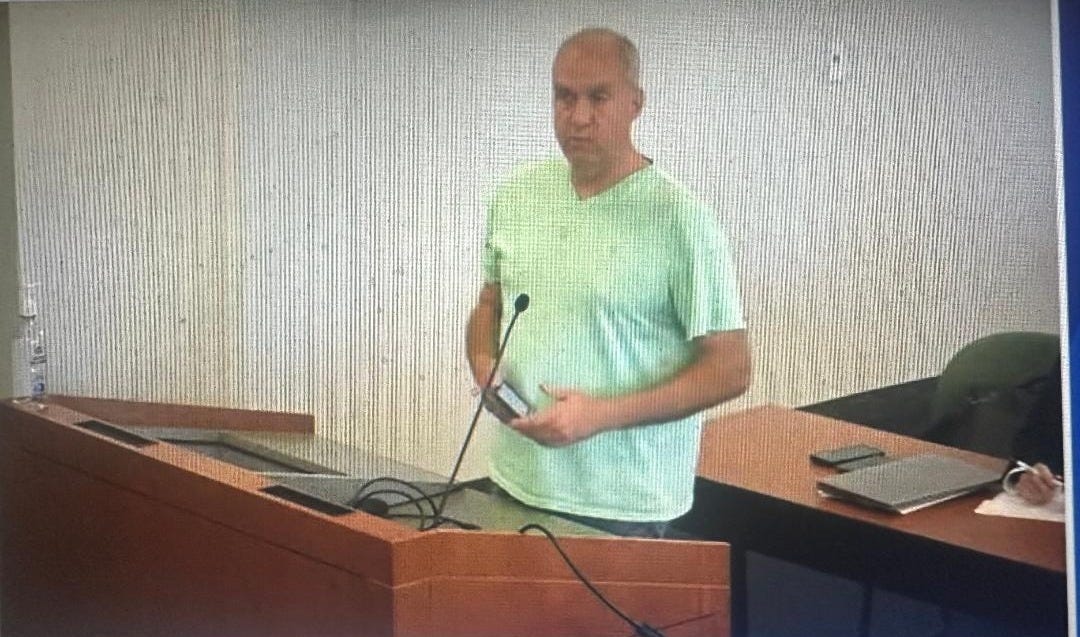Public Defense on Trial: Lorain County’s Push for a Public Defender’s Office Raises Questions of Cost, Control, and Credibility

How a proposal billed as reform could cost more, weaken accountability, and serve political interests
Aug 27, 2025
A Shift in Justice—or Just Another Power Grab?
On August 26, the usually half-filled chamber of the Lorain County Commissioners buzzed with unusual energy. Rows of attorneys, courthouse staff, and curious citizens packed the seats, sensing that the agenda’s pivot from mundane infrastructure updates to the heart of the justice system was more than procedural—it was pivotal. This wasn’t just another meeting; it came in the shadow of ongoing scandals. The commissioners are already under fire for the botched CCI communications contract, now the subject of costly litigation, and for rushing ahead with the controversial Clearwater sewer plan despite public opposition. Against that backdrop, the proposal to overhaul indigent defense felt to many like part of a larger pattern: consolidate power first, justify it later.
The question before the commissioners was deceptively simple: should Lorain County scrap its long-standing appointed counsel system—where judges assign private attorneys to represent indigent defendants—and replace it with a county-run Public Defender’s Office?
Thanks for reading Aaron’s Substack! Subscribe for free to receive new posts and support my work.

Commissioner Dave Moore pitched the idea with confidence, presenting it as a matter of fiscal responsibility. “We’re spending millions on appointed counsel, and it’s concentrated in the hands of a few attorneys,” Moore declared, implying the current system was bloated, unfair, and ripe for reform.
To a casual observer, Moore’s words might have landed as common sense. But to those who knew the system, his framing raised alarms. The audience wasn’t just hearing a budget argument; they were hearing the opening salvo of what many saw as a power grab. In a county already accused of secrecy, favoritism, and questionable financial decisions, this proposal struck critics as another attempt to centralize control over a core public function—this time, the right to independent legal representation.
What was at stake went far beyond dollars and cents. The appointed counsel system is the mechanism that ensures poor defendants have independent legal representation, free from political influence. Centralizing that function under the same county leadership embroiled in scandal threatened, in the eyes of many present, to erode the very independence the Constitution guarantees.
By the time Moore finished his pitch, the tension in the room was palpable. Attorneys exchanged knowing glances. Some scribbled notes for their upcoming remarks. What appeared on the surface to be a conversation about efficiency had become, in reality, a debate about whether justice itself would remain independent—or be folded into the county’s expanding web of political control.
The Numbers Behind the Narrative
Lorain County currently spends roughly $3.8 million annually on appointed counsel. After factoring in Ohio’s 82 percent reimbursement rate, the county’s actual cost hovers around $600,000—a fraction of the $5 to $6 million budgeted annually for the prosecutor’s office. Over the past five years, appointed counsel expenditures have fluctuated only modestly, ranging from $3.5 to $4 million annually, despite rising case loads. This consistency is possible because the system is inherently flexible: attorneys are assigned as needed, allowing the county to pay for representation only when cases arise rather than maintaining a permanent, full-time staff.

“Taxpayers are paying pennies on the dollar for a constitutionally mandated service.” — Brandon Oliver, President, Lorain County Bar Association
Creating a county-run public defender’s office would dramatically alter this equation. Salaries for even a modest staff of twenty attorneys, based on statewide averages of $75,000 to $90,000 per attorney, would total between $1.5 and $1.8 million annually before benefits. Add to that at least five investigators at $55,000 each, administrative staff, office space, training, and pension obligations, and the baseline cost easily climbs over $3 million per year. Even with the state’s reimbursement, the net expense to Lorain County taxpayers would be several times higher than what they currently pay. And that’s assuming no cost overruns, no litigation over caseloads, and no future expansions—all of which have plagued similar offices in other Ohio counties.
The Quality Question and the Independence Illusion
The county’s appointed counsel system has built-in safeguards that its critics often ignore. Attorneys on the list must meet mandatory training requirements, carry malpractice insurance, and are directly accountable to judges who observe their work daily. If an attorney underperforms, a judge can remove them from the roster immediately—a level of oversight that a politically staffed public defender’s office cannot easily replicate.
Brandon Oliver, President of the Lorain County Bar Association, didn’t mince words in opposing the commissioners’ plan. As the elected leader of over 300 attorneys practicing in the county, his perspective carried the weight of the entire legal community. “Taxpayers are paying pennies on the dollar for a constitutionally mandated service,” Oliver told the commissioners. “Replacing this with a full-blown office could multiply costs, not reduce them.”
Zach Simonoff, Chair of the Bar Association’s Criminal Section, drove the point home on behalf of those handling the county’s most serious cases.
“This isn’t about fixing a broken process,” Simonoff said. “It’s about changing who controls it. A public defender’s office doesn’t guarantee independence—it centralizes power.”

Oliver and Simonoff represent two of the most authoritative voices in Lorain County’s legal community: one speaking for the breadth of the bar, the other for its criminal defense specialists. Their unified stance was more than a policy disagreement—it was a rare, public rebuke of a proposal they see as politically motivated and potentially damaging to the justice system itself.

Enter Aden Fogel: From Critic to Cheerleader
Perhaps the most surprising moment of the meeting came when Aden Fogel, a convicted felon known for his years of attacking these very commissioners, took to the podium to voice support for the public defender plan. For four years, Fogel berated Dave Moore, Jeff Riddell, and their allies in public meetings, threatening lawsuits, vowing to expose corruption, and positioning himself as their fiercest critic.
Yet on August 26, Fogel stood before the commissioners praising their “leadership” and reading a speech from his phone that, by multiple accounts, echoed Moore’s own talking points almost verbatim.
Even more striking is the timing. Fogel is now a declared candidate for a city council seat in Sheffield Lake. His abrupt shift from antagonist to ally raises obvious questions about motivation. Is this newfound support for the commissioners about policy—or politics? Aligning with influential county figures could open doors, endorsements, or quiet backing for his campaign.
“I want to thank the commissioners for their leadership on this,” Fogel told the board. For critics, that moment crystallized the entire debate. This wasn’t about saving money or improving justice—it was about power, and who would control it.
This context casts his remarks in a different light. Why would a man who once called these commissioners “crooks” now stand beside them in one of their most controversial proposals? What changed? And why should taxpayers trust a plan being championed by someone with such a sudden, self-interested pivot?

Follow the Pattern: Control First, Justification Later
Fogel’s sudden about-face isn’t just curious—it’s emblematic of how power operates in Lorain County. This isn’t the first time a controversial figure or unexpected ally has emerged to back a county initiative, only for it to later become clear that their support served a deeper political purpose.
The public defender proposal fits neatly into a broader pattern. Like Clearwater, it is being sold as reform while functioning as a vehicle for consolidating authority. Commissioner Dave Moore’s focus on “efficiency” and “cost savings” echoes the language used to justify the MARCS radio system—a project that promised seamless communication but ended up plagued by cost overruns, functionality problems, and taxpayer frustration. The same rhetoric underpinned the CCI communications contract, now mired in litigation and a symbol of how secrecy and insider dealing can drain public trust and public coffers alike.
The timing of this push only deepens the concern. With the county already reeling from the CCI fallout and bracing for public backlash over Clearwater, bringing indigent defense under direct county control gives commissioners another powerful lever. A public defender’s office would provide not just a new department, but a new source of jobs, contracts, and influence over one of the most sensitive functions of local government—the criminal justice system itself.
Final Thought: When Justice Becomes a Bargaining Chip
The right to counsel is enshrined in the Constitution. It is a safeguard against state power, a guarantee that every defendant receives a fair trial. Transforming that right into another political asset for county leaders would be a betrayal of its purpose.
Lorain County’s appointed counsel system isn’t perfect, but it is cost-effective, flexible, and accountable to the courts. The proposed public defender’s office offers none of those advantages. Instead, it carries the hallmarks of every failed “reform” this county has seen: inflated promises, hidden costs, and political opportunism.
Aden Fogel’s sudden conversion from watchdog to cheerleader, coupled with his bid for office in Sheffield Lake, underscores what’s really at stake. This isn’t about saving money or improving justice—it’s about power. And unless the public demands transparency and accountability now, justice in Lorain County may become just another bargaining chip in a long game of political self-preservation.
This is Part II of my series on the August 26, 2025 Commissioners’ meeting. Next, in Part III, I’ll examine the CCI lawsuit and how years of secrecy and mismanagement have drained public resources and eroded trust in county government.
Written by Aaron C. Knapp for Lorain Politics Unplugged
Legal Disclaimer: The information and opinions expressed in this article are based on publicly available sources, official statements, and my independent analysis as a journalist. While I have taken care to ensure accuracy, this article is not legal advice and should not be relied upon as such. Readers are encouraged to review public records, attend public meetings, and consult qualified professionals before making any decisions based on the issues discussed herein. All individuals and entities mentioned are presumed innocent of wrongdoing unless proven otherwise in a court of law.




